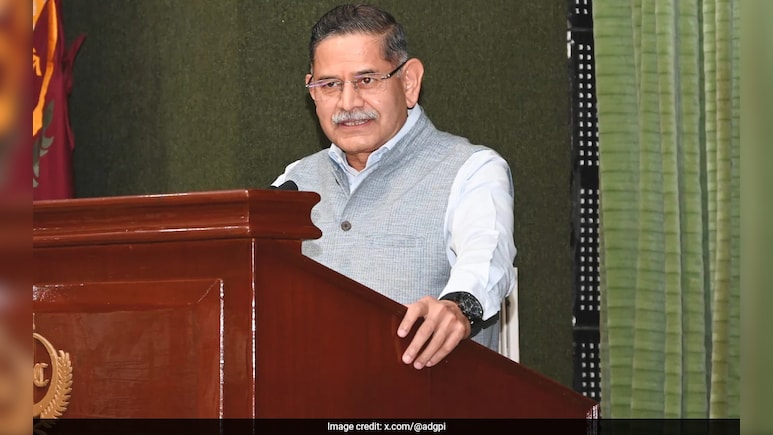
Army Chief General Upendra Dwivedi on Friday said warfare is becoming increasingly "non-kinetic and non-contact" owing to multiple factors and therefore demands a response that requires military strength, and intellectual, technological and moral preparedness.
Chanakya's teachings remind us that the "rising powers inevitably provoke countervailing coalitions", he said in his address at an event held at Manekshaw Centre here to mark the 150th birth anniversary of Sardar Vallabhbhai Patel.
"National security involves preparing for strategic balancing, deterrence, and resilience against these counter reactions. Herein, our opportunities are immense, the demographic dividend of the world's youngest population, transforming technologies, and a strategic geography," he said.
Yet so, are the challenges, the Army chief added.
In his keynote address, he emphasised the evolving nature of warfare and the responses needed in this scenario.
"Firstly, we have traditional rivalries and collusive threats leading to more than a half, that is more than two-and-a-half front challenges. Secondly, terrorism, proxy war, and internal threats still persist. Thirdly, and more importantly, disinformation campaigns seek to fracture our social fabric from within.
"Therefore warfare is becoming increasingly non-kinetic and non-contact. It flows through fibre cables, flickers on screens, circulates in wallets and ripples across our classrooms. Obviously, the response demands just not arms' strength, but intellectual, technological and moral preparedness," Gen Dwivedi said.
He further said in this era of multi-domain challenges, national security and nation building are "inseparable, requiring a whole-of-nation approach", harnessing the combined resolve of governance, industry, academia and civil society.
Union minister Kiren Rijiju also addressed the gathering of army officials, students and defence experts at the Chanakya Defence Dialogue: Young Leaders Forum hosted by the Army and defence think-tank Centre for Land Warfare Studies.
Col Sofiya Qureshi, who was one of the prominent faces in media briefings on Operation Sindoor, also attended the event.
The Army chief said in the recent Operation Sindoor, many amongst you would have been actively involved. Some as young military officers, some as NCC cadets, some in civil defence, some in drone labs, while some as "social media warriors".
And, with over 65 per cent of India's population below the age of 35 and almost 50 per cent under 25, "we are a nation of youth, a country of boundless energy, ideas, creativity and courage", adding India's skilled human resource is "one of our greatest instruments of power".
In his address, he referred to the 'Gen Z' population of the country, which he said, is the largest in the world. And though Indian Army is the world's second largest, so Generation Z has "beaten the Indian Army also," he said in a lighter vein.
It stands at the centre of this "new battle space, digitally fluent, socially aware and globally connected".
"They are India's greatest strength if guided by discipline and direction. That is the melange of passion with purpose," he added.
Gen Z or 'Generation Z' refers to the demographic group born roughly between the late 1990s and early 2010s, with birth years varying by source, such as 1996-2010 or 1997-2012.
It is with this very understanding of security as a collective enterprise, that the Indian Army has embarked on a decade of transformation focused on jointness with everybody, "including the youth present today or connected to us, restructuring and modernising old structures while constantly evolving our human resources, he said.
The troika of the industry, academia and the armed forces forms the "backbone of this transformation".
"The youth have a role in each facet of this.., in labs, industries, start-ups, think-tanks and battlefields, apart from the traditional cradles of leadership, the Sainik School, military school, the NCC, which we are well known to. The army has now reached out to the youth through our 16 technology clusters. The Indian army sells in IITs and also commenced in 2025, a paid army internship programme," he added.
This is because, the Army realises that the comprehensive national power is not only built on the security circles, but also in classrooms, communities and consciences. "We, the men and women in uniform, rely on you in all fields, including the field of technology".
"So, today I would like to give a call to action to our youth," he said.
The Army chief also asserted that national security is not just about soldiers at the borders, it's also about citizens and youths who "refuse to be indifferent".
It was announced at the event that Chanakya Defence Dialogue 2025 will be held in November on the theme "Reform to Transform: Sashakt and Aur Surakshit Bharat" on November 27-28.
(Except for the headline, this story has not been edited by NDTV staff and is published from a syndicated feed.)
Track Latest News Live on NDTV.com and get news updates from India and around the world

